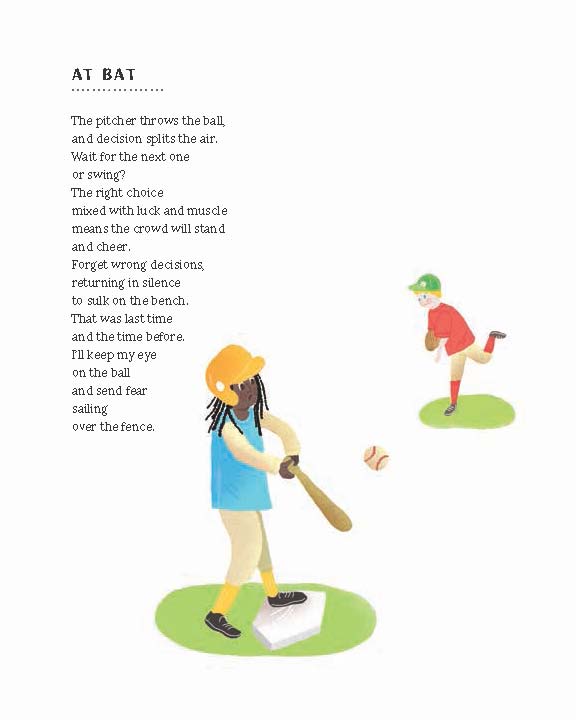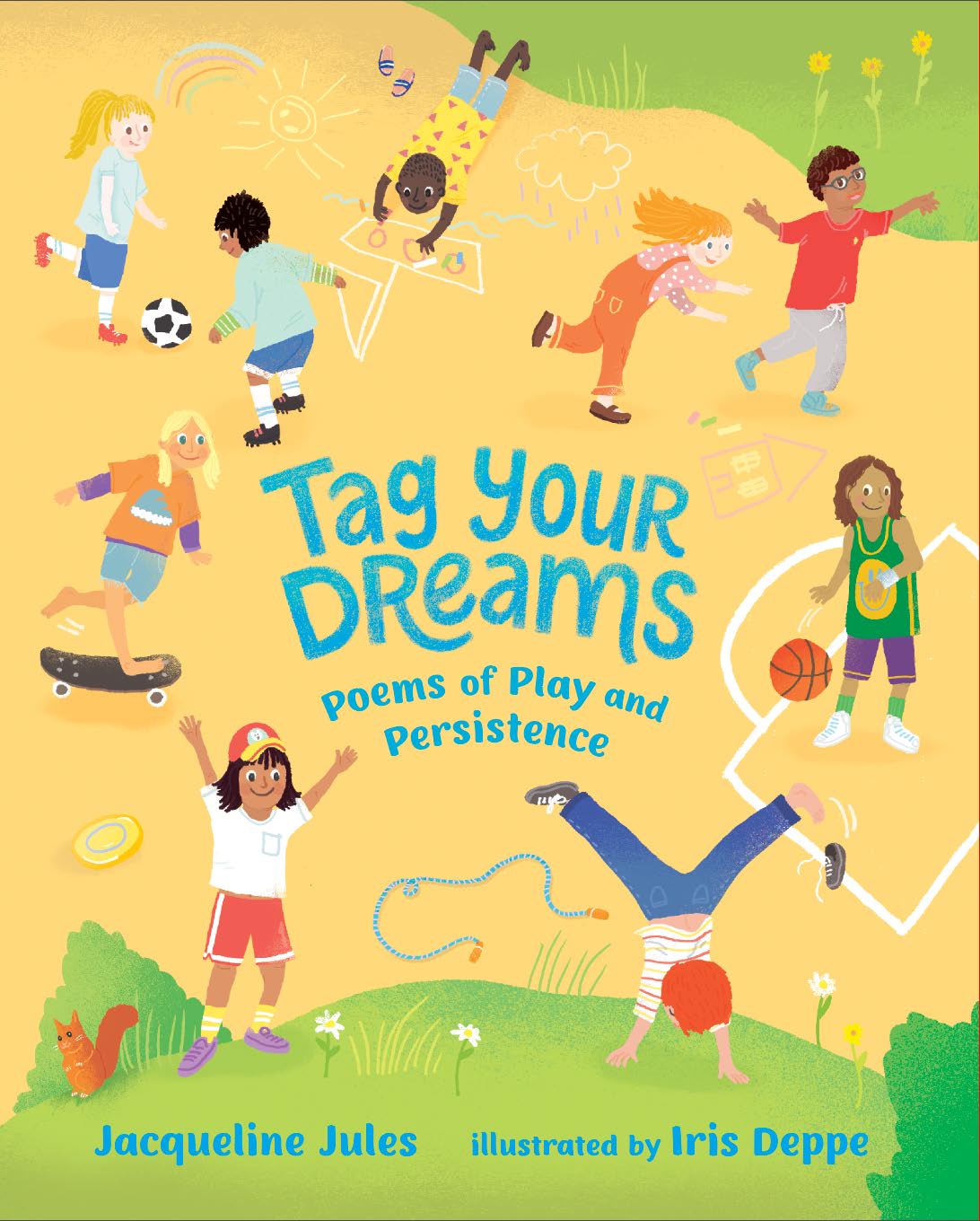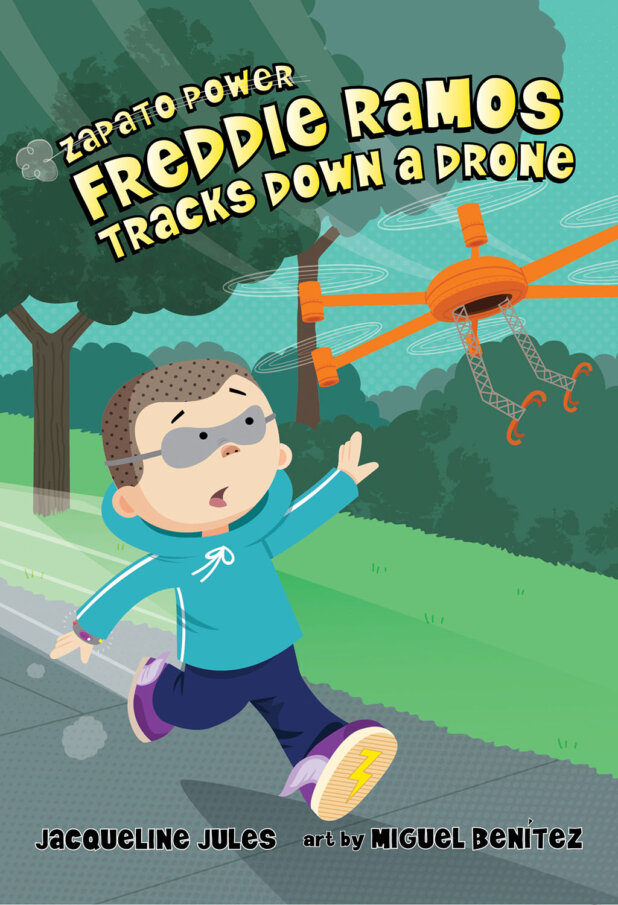by Jacqueline Jules, illustrated by Iris Deppe; Albert Whitman, 2020.
Persistence and play. If ever there were a time for persistence, it is now. And if ever there were a time to encourage children to play in an effort to ward off stress and shift the focus from our uncertainty, it is now. We have the time, it is the time, to encourage and savor play. I feel certain that when Jacqueline conceived of the Tag Your Dreams collection of poems, she did not anticipate COVID-19. But here we are. Order a copy of this book. Swipe it with an antiseptic wipe several hours after it arrives, and then reflect on the poems between its covers with your playful roomies.
“Play is often talked about as if it were a relief from serious learning. But for children play is serious learning.”—Mr. (Fred) Rogers
As I write this, we have been in the house for over a few weeks, going out solely to walk our six-month old yellow Lab. I know you can relate. When I clicked on dictionary com to see how they define persistence (persevering; enduring tenaciously), the Word-of-the Day that popped up was stir-crazy. Go ahead, laugh. It feels good to share some humor.
In her introduction to Tag Your Dreams, Jacqueline shares with readers that this collection of poems is meant to “celebrate being active, reaching goals, and learning limits.” The imaginary narrators of the poems within “discover themselves and their strengths through playing.” What stands out to me as the value of this collection is the thread of persistence–from dreaming and inspiration to the grit of trying and defying obstacles, from encouragement and achievement to acknowledgement and acceptance of the best we can do. That last bit sets this book apart; it’s a valuable takeaway for all of us to reflect upon, empowering us through self-discovery.

Illustration © Iris Deppe
Grade level: Grades 1-3
Social-Emotional Learning Themes
Acceptance, bravery, courage, kindness, compassion, tenacity, perseverance, persistence, play, inspiration, encouragement, acceptance, responsibility, helpfulness, perspective, fortitude, self-reliance, respect, gentleness, gratitude, effort, understanding, connection, diversity, inclusion, self-assurance, resilience, hope, dedication
Content Area Connections
Play, Recess, Sports, Physical Education
Using This Book in the Classroom
Hit the Ground Running
Ready Resources for Educators, Homeschoolers, and Parents
A Teacher’s Guide for Tag Your Dreams can be found on Jacqueline’s website here.
In fact, Jacqueline has an extensive educator and parent-friendly website chock full of resources. Peruse the various tabs across the top that lead visitors to valuable materials developed for use with her wide array of books, a selection of her poems, blog posts, web links, book trailers, and more.

Illustration © Iris Deppe
Write Away!
Ideas to prompt writing
Following a discussion of one or more poem styles, such as free verse, end rhyme, haiku, list poems, tanka, or sijo, ask students to create and illustrate a poem about their favorite sport, recess game, or playtime activity. Share and display poems.
Ask students to choose a poem from Tag Your Dreams and write about why it is their favorite. What did they like best about the poem? What will they remember after reading this poem?
Ask students to choose a poem from the Tag Your Dreams collection and write about what this poem made them think about that they hadn’t considered before.
Ask students to choose a poem from Tag Your Dreams that connects with a book they have read. Considerations include subject, theme, and takeaway message. Have students write a paragraph summary of the book. In the second paragraph, ask students to explain why the poem they have chosen links well with the book.
Jacqueline’s Poems from Classroom Presentations for Grades 3 and up and “Writing Lessons from Pencil Tips” blog offer a wide variety of useful and creative suggestions for exercises related to her poetry.

Illustration © Iris Deppe
Poetry Break
Related poetry to recite before or following the reading of this book
Poetry breaks fit perfectly into brief moments in the day—from opening or closing the daily morning meeting to lining up for lunch; from zipping up backpacks and jackets to transitioning from one subject to the next. Reading a poem typically takes less than a minute, yet it can introduce or reinforce a concept, celebrate language, exemplify rhythm, enhance vocabulary, expand understanding, increase attention span, initiate reflection, or summon a giggle. And, poetry soothes the spirit.
The following poetry book collections also focus on play:
- Messing Around On the Monkey Bars and Other School Poems for Two Voices by Betsy Franco, illustrated by Jessie Hartland
- The Fastest Game on Two Feet And Other Poems About How Sports Began by Alice Low, illustrated by John O’Brien
- Outside the Lines: Poetry at Play by Brad Burg, illustrated by Rebecca Gibbon
As we celebrate Poetry Month, my intention is to shine an even brighter light on poetry’s enhancement of instruction throughout the year. In the spirit of celebrating Poetry Month with us, Jacqueline offers a few recommendations of poetry collections by her peers and explains why:
Can I Touch Your Hair? by Irene Latham & Charles Waters. Through narrative poems, this book tells a wonderful story of how friendship and understanding blossomed between two very different students working on a school project.
Out of Wonder: Poems Celebrating Poets by Kwame Alexander. I checked this book out of the public library and as soon as I finished it, I ordered a copy for my personal library. This book is a beautiful celebration of poetry and twenty important poets every young reader should know.
Jacqueline also suggests the Poetry Friday Anthologies published by Pomelo Books. “I have used these resources many times for teaching my own poetry workshops. The anthologies include a wide variety of poems, both rhyming and free verse, on every topic imaginable. Some of the anthologies are specific to subject. For example, there is the Poetry Friday Anthology for Celebrations: Holiday Poems for the Whole Year in English and Spanish and The Poetry of Science: Poetry Friday Anthology for Science for Kids. Each book contains poems by noted children’s poets from all over the country. And every anthology includes teaching activities. The Poetry Friday Anthologies are amazing resources for the classroom.”
Listed below are recommendations for poetry handbooks for educators. I’ll include additional guides in my next poetry-focused blog post later this month.
- Awakening the Heart: Exploring Poetry in Elementary and Middle School by Georgia Heard
- For the Good of the Earth and Sun: Teaching Poetry by Georgia Heard
- Pass the Poetry, Please! 3rd Edition by Lee Bennett Hopkins
- Poetry from A to Z: A Guide for Young Writers compiled by Paul B. Janeczko
- What is Poetry? The Essential Guide to Reading & Writing Poems by Michael Rosen
And Then There’s This…
Enrichment activities, related books, online resources, craft projects, and ideas for further study
Find activity sheets, finger plays, crafts, Reader’s Theater, recipes, discussion guides, and teachers’ guides for Jacqueline’s other books here.
About the Author

Jacqueline Jules has been writing poems since middle school. Her poetry has been published in over a hundred publications and three chapbooks. She is also the award-winning author of over 40 books for young readers, including the Zapato Power series, the Sofia Martinez series, Unite or Die: How Thirteen States Became a Nation, Duck for Turkey Day, Never Say a Mean Word Again, Feathers for Peacock, Pluto is Peeved, and The Generous Fish. She is a former elementary school librarian who lives in northern Virginia. Visit www.jacquelinejules.com for more information.
Q&A with Jacqueline Jules
Jacqueline graciously responded to a few questions about Tag Your Dreams and her writing career spanning a range of age levels and genres.
Judy Bradbury: How did you come to write the Tag Your Dreams? What seeded its creation?
Jacqueline Jules: I began writing Tag Your Dreams over twenty years ago when I was a baseball mom, spending many evenings and weekends watching my sons play in Little League games. My admiration for the players as they entered the batter’s box each inning with new determination inspired me to write the poem, “At Bat.” During basketball season, as I once again watched my boys play, I saw a metaphor for persistence which I described in the poem, “Rebounding Luck.” Sometime later, a memory of learning to ski popped into my mind and I wrote “Graceless Girl Skis Down Slope.” Every year, I wrote more and more poems with sports imagery until I finally realized that I had enough poems for a book.
JB: Tell about one hurdle you experienced in the creation of Tag Your Dreams or provide a memorable (or humorous!) anecdote related to the making of this book.
JJ: The original manuscript had nine fewer poems than the final one. My amazing editor at Albert Whitman, Andrea Hall, suggested I add some poems which did not involve team sports or expensive lessons. Writing these additional poems gave me the opportunity to explore physical activity through a different lens. For example, “The River Trial” describes hiking with grandparents and how they impart their love of nature. “Kick Scooters” tells the story of a son reconnecting with his dad while riding side by side on scooters through Central Park.
JB: The poems in Tag Your Dreams get at the heart of the pursuit of goals in play and the hurdles sports sometimes present between players as well as within ourselves. Which of the poems are especially meaningful to you? Why?
JJ: The poems which speak directly about perseverance are my favorite. Athletes must face each competition as if they had never failed in the past. In the poem “Olympic Skater” the narrator watches a contender rise after a fall “In one sweeping circular motion as if the question of getting up never existed at all.” Writing these poems inspired me to keep trying after disappointment. I hope they will inspire my readers, too.
JB: What did you learn from creating Tag Your Dreams?
JJ: While writing these poems, I researched many of the sports to make sure I remembered the rules correctly. My research revealed exciting metaphors which took my poems in new directions. For example, the narrator of the poem, “Volleyball” contemplates how “Double hits are against the rules” and why winning the game requires a team effort.
JB: What would surprise readers to learn about you or about the creation of Tag Your Dreams?
JJ: At the time I wrote the title poem, “Tag Your Dreams,” I was discouraged about my writing career. I was afraid I would never publish another book. The poem was a pep talk to myself because I needed some encouragement to keep chasing my dreams.
JB: What do you hope readers will take away from Tag Your Dreams?
JJ: I hope readers will see themselves being active, having fun, facing fears, and reaching goals.
JB: How do you see Tag Your Dreams connecting to curriculum?
JJ: Poetry units often culminate with student writing. Students are naturally motivated to write about the games they enjoy in their free time. The collection of poems in Tag Your Dreams provides models for writing about favorite sports and activities.
I have written a Teacher’s Guide for Tag Your Dreams which contains discussion questions and writing prompts for each poem. The guide will be available on the Albert Whitman website and my website.
JB: What is one question you wish I had asked, and what is your answer?
JJ: I’d like to talk for a moment about the power of writing poetry. Poetry expresses emotion and shares special experiences. It helps us understand ourselves and our world better. And poetry can be found everywhere. No topic is too mundane. Look around you and see the metaphors in everyday life, waiting to be discovered.

Illustration © Iris Deppe
About the Illustrator
Iris Deppe is the illustrator of several children’s books. She was born and raised in the Caribbean and currently lives in the Netherlands, where she moved to study illustration at Utrecht University of the Arts.
Book Giveaway!
Subscribers who leave a comment will be entered in a drawing to win a copy of Tag Your Dreams, courtesy of the author. A winner will be chosen randomly and announced when the next guide is posted.
And…the winner of a copy of Big Papa and the Time Machine by Daniel Bernstrom, illustrated by Shane W. Evans is Kathy Blasi. Thank you to Dan for kindly providing a signed copy of the book for this purpose.
News & Updates
In celebration of National Poetry Month, I will be posting again in April, featuring poet Amy VanDerwater and her new book, Write! Write! Write!.
Plan to stop by and join us as we continue to explore ways in which poems add value and dimension to teaching and learning!




I especially like the title poem of this collection but also enjoyed the others shared here, as well as the book’s playful illustrations. I found it interesting to learn more about the poet and how she came to write this collection of poems. I’m glad she persevered when her editor asked her to write more poems not connected to sports. That advice helped open this collection up to an even wider variety of young readers. Thank you, Judy, for bringing this book and this poet to my attention.
I very much agree with Marsha. I loved the sampling of poems in this post, including the variety of sports/activities the thoughtful poems cover. Judy, I appreciate how much planning goes into your posts, with additional resources and links, including to Jacqueline’s great website.
Thank you, Vivian. I absolutely agree that Jacqueline has put together a wonderful collection of play-related poems, and she does indeed maintain an outstanding website for educators, parents, and children to use.
Children’s poetry is my favorite and I enjoy studying mentor text to improve my own skills.
Hi Danielle! Well, if children’s poetry is your favorite, then April, National Poetry Month, must be your favorite month of the year! Be sure to stop by for my next post in which I will list several notable new poetry books for kids. It’s always a pleasure reading your comments, Danielle. Hope everyone is well over there.
We are well, thank you!
Marsha, thank you for your thoughtful comments. I agree: Jacqueline was so generous and honest in sharing her experiences as an author and details of her process in creating this collection. Her extensive website reflects Jacqueline’s commitment to young readers and educators alike, to be sure! It was my pleasure to feature her and her books on my blog.
I appreciate the sincerity of this write-up of yours. Can’t wait to see more!
Thanks, Brian. I’m glad to hear the post was helpful. It’s a great book!